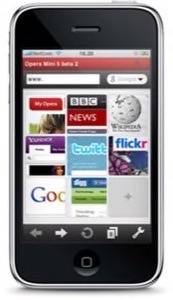Mobile browser maker Opera is out with its latest report on the state of the mobile Web, and this time, it’s calling the growth “stunning.” Since August of last year, the number of uniques has increased by 108.3%, page views by 143.2% and data traffic by 134.4%.

And from July to August 2010, page views went up more than 14% and data transfers went up 10%. Also in August, the company saw more than four million new Opera Mini users, the largest gain the company has seen in half a year. Jon von Tetzchner, Co-founder of Opera Software, says these numbers aren’t limited to smartphones alone, but represent a “global phenomenon” of people joining the mobile Web.
Says Tetzchner, the mobile Web “will bring tremendous social and economic change to people in many countries,” and its growth is still accelerating.
From July to August, there was only a 6.8% increase in Opera users, for a total of 66.5 million users worldwide by August’s end. That may seem like a small change, but in historical context, it’s easy to see the series of small jumps like these that Opera has made over the past couple of years. Combined, these ongoing increases point to the very real trend that is the rapid adoption of the mobile Web.
Data Snapshots
Opera users are now consuming more data than before – traffic is up 134.4% since August 2009. If Opera’s data was not sent compressed (as it is), the data traffic would have equaled 4.5 petabytes during that same time.


The report also offers snapshots of data in a number of markets, including Asia, parts of Europe, the Middle East and U.S. In most of these markets, Nokia handsets dominate the top ten handsets list, but Opera did not include a global top ten list with this month’s report.
Going forward, Tetzchner says Opera will be doing more deep dives into the delveloping markets where Opera is most popular.
Stats for U.S. Seem Odd
One note about this recent data: it’s interesting to see the Apple iPhone still listed in the U.S.’s number one spot, especially given the quality of the Safari browser that ships with Apple’s device. It’s clear that Opera is tracking downloads instead of active users. A lot of iPhone users were curious about Opera’s browser when it launched, given the PR campaign that accompanied it. Opera had put Apple on the spot, essentially daring it to reject the app from the App Store, something that was a real possibility at the time, since Opera competed head-on with Apple’s own Safari browser. Opera blogged about the app’s submission and then kept an ongoing countdown of the number of days it had been under review, apparently expecting to never get in. Apple ended up accepting the app with little fanfare.

The fact that Opera is still counting all those original downloads to determine its “top 10” handset list puts into question its methodology, at least here in the U.S. Outside the U.S., where Nokia phones are still popular, the data is likely to be more accurate as those who download Opera probably continue to use it more regularly.
The full report is available online here.

















